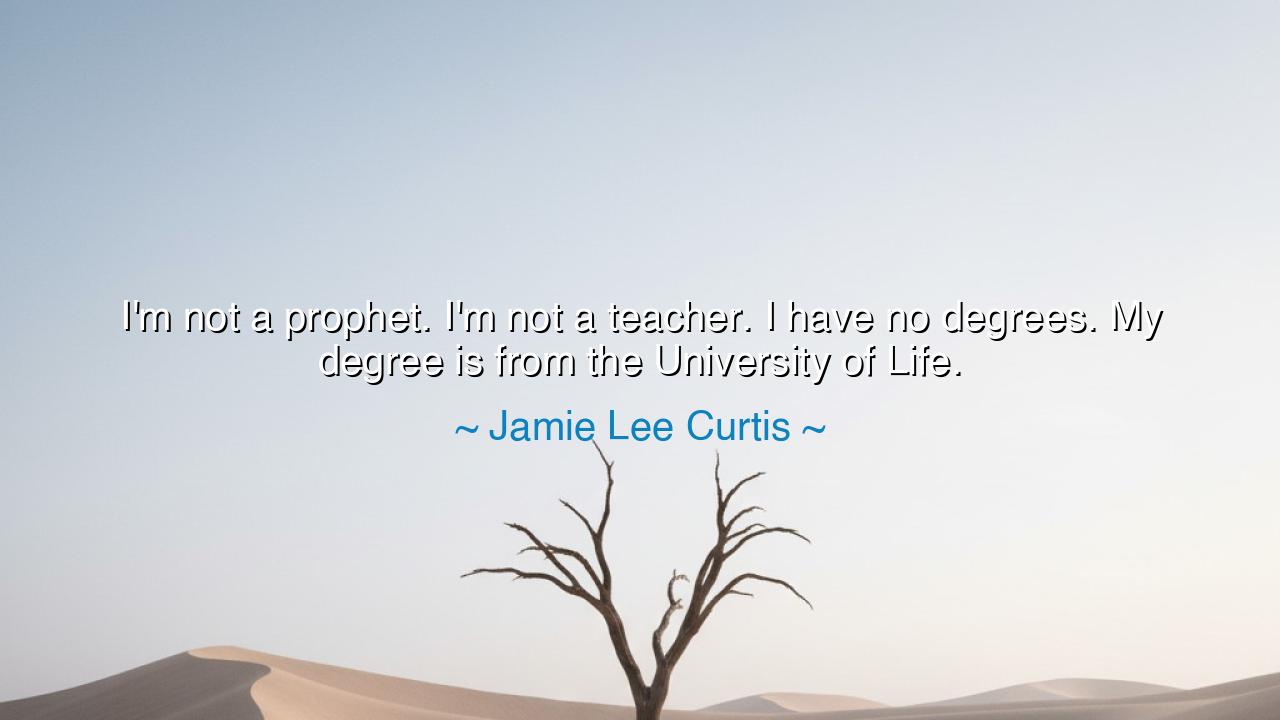
I'm not a prophet. I'm not a teacher. I have no degrees. My
I'm not a prophet. I'm not a teacher. I have no degrees. My degree is from the University of Life.






When Jamie Lee Curtis declared, “I’m not a prophet. I’m not a teacher. I have no degrees. My degree is from the University of Life,” she offered not a denial of wisdom, but a redefinition of where wisdom is truly born. She stripped away the garments of authority—titles, degrees, and sacred offices—and revealed a deeper truth: that the greatest teacher is experience, and that the harsh yet tender halls of the University of Life shape the soul more profoundly than any institution of man. These words are not of arrogance, but of humility, an acknowledgment that what she knows does not come from parchment or ceremony, but from the blood and fire of lived reality.
In saying she is not a prophet, she refuses the mantle of one who claims to foresee the mysteries of destiny. In saying she is not a teacher, she refuses the throne of one who presumes to instruct all others. Yet her refusal is itself a kind of teaching, her humility a prophecy in disguise. For the ancients knew well that wisdom often comes from those who do not claim it. The farmer who works the soil, the mother who cradles her child, the traveler who learns from strange lands—these often hold more truth in their silence than the loud proclamations of those who bear the titles of sage or scholar.
History itself bears witness to this paradox. Recall the life of Diogenes the Cynic, who scorned the grand academies of Athens and lived in a clay jar, yet through his very life taught lessons sharper than any scroll. When asked why he rejected convention, he replied by pointing not to words but to the simplicity of his actions. Kings and philosophers alike came to listen to him, though he claimed no throne, no degree, no title. Like Curtis, he lived his curriculum in the open air, his degree written in the dust of existence itself.
Yet the world often worships credentials and crowns. Men bow before degrees framed upon walls, and lend ears only to those who stand behind lecterns. But the University of Life is older than all academies. It teaches with the weight of suffering, with the warmth of love, with the discipline of failure and the triumph of endurance. Its lessons are written not in ink but in scars, in laughter, and in tears. To graduate from this university requires no ceremony, for the tassel and gown are woven into the fabric of every day survived with courage.
What, then, shall we take from Curtis’s confession? We learn that wisdom does not belong only to the titled and the exalted. One does not need to be called teacher to impart truth, nor prophet to inspire vision. The baker may teach resilience, the wanderer may speak of freedom, the laborer may reveal dignity in toil. The greatest degree is often held by those who never sought one, but who walked the burning path of existence and emerged with hearts unbroken.
For you, the reader, the lesson is this: do not measure your worth by the titles the world bestows. Do not despise your knowledge because it was learned outside the walls of formal halls. Instead, cherish the wisdom born of your own struggles. Ask yourself not, “What degree do I hold?” but “What truths have I lived?” Share those truths when the moment calls for it, for in doing so, you become a quiet teacher, though you never claimed the name.
Practically, live by embracing the curriculum of experience. When you fail, record the lesson in your heart. When you suffer, let endurance be your textbook. When you love, let generosity be your diploma. Speak honestly of what you know, and remain silent on what you do not, for honesty itself is the highest degree. Seek mentors in life’s common places, and become a mentor when others stumble along paths you once walked.
Thus, let Curtis’s words remind us of a simple but immortal truth: the greatest university is the one that none escape, the University of Life. There, every soul is both student and teacher, every trial a lecture, every triumph a graduation. Let us walk its halls with courage, and remember that the only true degree is the wisdom we carry within, forged by the fire of living itself.






AAdministratorAdministrator
Welcome, honored guests. Please leave a comment, we will respond soon